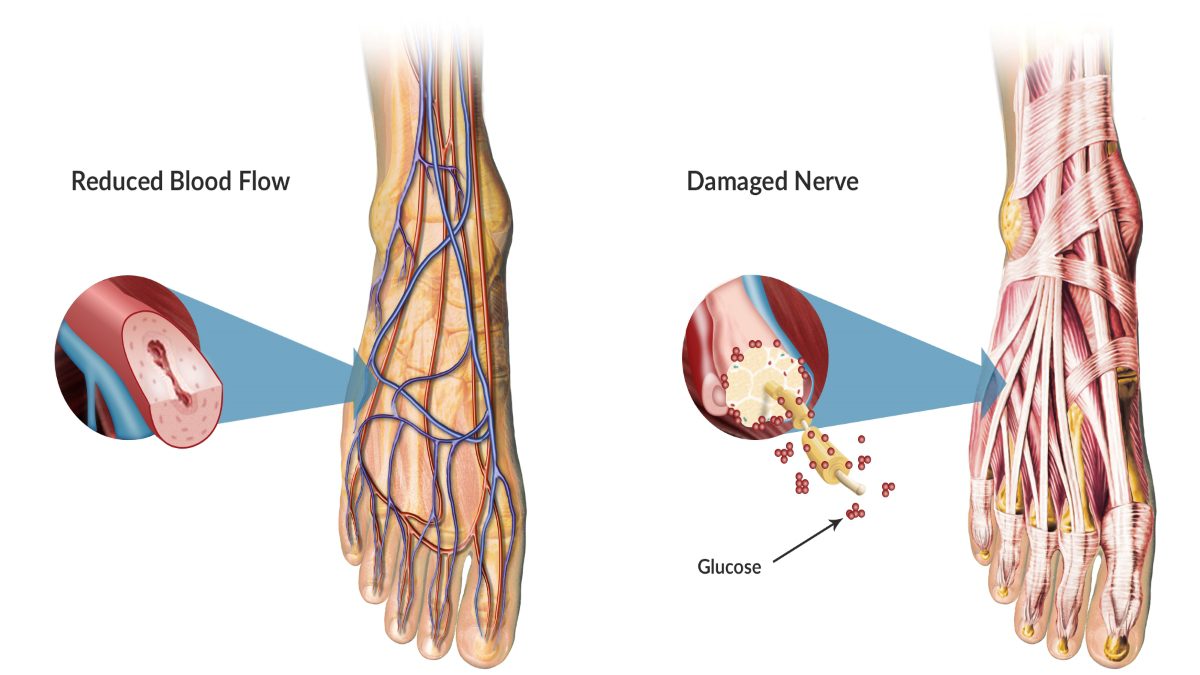What is diabetic neuropathy?
Diabetic neuropathy is a general term used to describe different types of nerve damage that occur in people who have diabetes. Diabetes is a condition that often results in high levels of glucose in the bloodstream or high blood sugar levels. Eventually, having too much sugar in your bloodstream damages your nerves and blood vessels.
Several important things are known about diabetic neuropathy:
- Higher levels of blood glucose make nerve damage more likely
- The longer you have diabetes, the more likely diabetic neuropathy is to develop
- People with diabetes who smoke or consume too much alcohol are more likely to have diabetic neuropathy
If you experience pre-diabetes or diabetes, you may decrease your risk of diabetic neuropathy by good blood sugar level control and following a healthy lifestyle. Part of a healthy lifestyle involves seeing your doctor on a regular basis. Because typically there are no diabetic neuropathy symptoms in its early stages, you may not know you have the condition. However, seeing your doctor routinely to check for the condition can help you get treatment for the problem before it results in serious complications.
Types of diabetic neuropathy
There are four types of diabetic neuropathy:
- Peripheral neuropathy: This type of diabetic neuropathy is the most common. It causes numbness and pain in the:
- Hands
- Arms
- Toes
- Feet
- Legs
- Autonomic neuropathy: This type of diabetic neuropathy can result in hypoglycemic unawareness, which is a dangerous condition that blunts the warning signs of low blood sugar. It affects the:
- Eyes
- Lungs
- Blood vessels and heart
- Digestive and urinary systems
- Sex organs
- Sweat glands
- Proximal neuropathy: This type of diabetic neuropathy may lead to leg weakness because of leg pain, and it also causes pain in the:
- Buttocks
- Hips
- Thighs
- Focal neuropathy: This type of diabetic neuropathy can affect any of the nerves or nerve groups in the body. It occurs suddenly and often causes pain that results in weakness in the:
- Thighs, legs, and feet
- Eyes, ears, and facial muscles
- Lower back and pelvis
- Chest and abdomen
Diabetic neuropathy symptoms
The symptoms of diabetic neuropathy depend on which nerves are affected and on what type of damage or neuropathy is present. Some people with diabetes who have neuropathy are unaware of the condition due to the lack of troubling symptoms. In other cases, the first sign of the disorder is foot pain, tingling or a numb or heavy feeling in the feet.
Because nerve damage usually happens slowly over the course of several years, mild diabetic neuropathy can go on for years, slowly destroying the nerves. When diabetic neuropathy symptoms develop, they can involve nerves that control movement, sensation, or involuntary functions. When focal neuropathy occurs, the pain may come on suddenly and be severe.
When nerves are damaged, they produce symptoms such as:
- Tingling, numbness and pain. This is most likely first to affect the toes and feet, fingers and hands. Later, the pain moves toward the center of the body to affect the arms and upper legs.
- Wasting away of the muscles of the hands or feet, or weakness in the muscles.
- Gastrointestinal symptoms, such as nausea, indigestion, or vomiting.
- Changes in bowel habits, like diarrhea or constipation.
- Changes in blood pressure, such as dizziness when sitting up from lying or standing up from a sitting position.
- Urinary symptoms, such as bladder problems.
- Sexual symptoms, such as erectile dysfunction or vaginal dryness.
Depression and weight loss are due to nerve damage, but they often accompany diabetic neuropathy.
Diabetic neuropathy cannot always be prevented, but you can reduce your risk of developing the condition by keeping your blood glucose levels as close to normal as possible.
Diabetic neuropathy causes
There are suggestions that uncontrolled blood sugar may damage nerves and inhibit their ability to send signals with time. It causes diabetic neuropathy.
Diabetic neuropathy risk factors
- Diabetes history. The longer you experience diabetes, the higher your risk of diabetic neuropathy development, particularly if your blood sugar is under poor control.
- Poor control of blood sugar. You are at high risk of developing any diabetes complications, including nerve damage, if you have uncontrolled blood sugar levels.
- Being overweight. Your risk of diabetic neuropathy development increases if your body mass index (BMI) is 25 or higher.
- Kidney disease. Kidneys damage may occur as a result of diabetes. Kidney damage releases toxins in the blood leading to nerve damage.
- Smoking leads to narrowing and hardening of your arteries that reduces blood flow to your legs and feet. As a result, it makes wound healing more difficult and leads to peripheral nerves damages.
Complications
Diabetic neuropathy may lead to a number of severe complications, such as loss of a foot, toe or leg; digestive problems; unawareness of your hypoglycemia; urinary incontinence or urinary tract infections; sharp drops in blood pressure; increased or decreased sweating; sexual dysfunction.
Click Here to read about treatment.
















Leave a Reply
You must be logged in to post a comment.